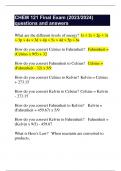Study guides, Class notes & Summaries
Looking for the best study guides, study notes and summaries about ? On this page you'll find 68 study documents about .
Page 3 out of 68 results
Sort by
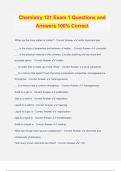
-
Chemistry 121 Exam 1 Questions and Answers 100% Correct
- Exam (elaborations) • 7 pages • 2024
-
- $11.49
- + learn more
Chemistry 121 Exam 1 Questions and Answers 100% Correct What are the three states of matter? - Correct Answer ️️ -solid, liquid and gas ___ is the study of properties and behavior of matter. - Correct Answer ️️ -chemistry ___ is the physical material of the universe. It is also anything the has mass and occupies space. - Correct Answer ️️ -matter __ is matter that is made up of one "thing" - Correct Answer ️️ -pure substance __ is a mixture that doesn't have the same co...
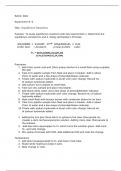
-
CHEM 121 Experiment 6: Equilibrium Reactions SPRING 2024 Portage learning
- Other • 4 pages • 2024
- Available in package deal
-
- $20.49
- + learn more
Experiment #: 6 Title: Equilibrium Reactions Purpose: To study equilibrium reactions with two experiments 1. Determine the equilibrium constant Kc and 2. Study LeChatelier’s Principle Procedure: 1. Add 10mL acetic acid and 10mL propyl alcohol in a small flask using a pipette. Mix well 2. Take 1mL pipette sample from flask and place in beaker. Add in about 25mL of water and a few drops of phenolphthalein indicator. 3. Titrate with sodium hydroxide in buret until color change. Record mL ...
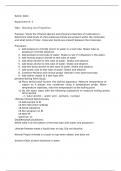
-
CHEM 121 Experiment 5: Bonding and Properties SPRING 2024 Portage learning
- Other • 8 pages • 2024
- Available in package deal
-
- $21.49
- + learn more
Title: Bonding and Properties Purpose: Study the infrared spectra and physical properties of molecules to determine what kinds of intra-molecular bonds are present within the molecules and what kinds of intermolecular bonds are present between the molecules. Procedure: 1. Add potassium chloride (ionic) to water in a test tube. Shake tube so potassium chloride dissolves. 2. Add pentate to test tube of water. Shake to see if it dissolves in the water. 3. Add normal propyl chloride to test t...
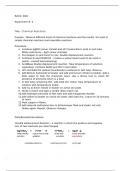
-
CHEM 121 Lab 4 Chemical Reactions SPRING 2024 Portage learning
- Other • 8 pages • 2024
- Available in package deal
-
- $21.49
- + learn more
Title: Chemical Reactions Purpose: Observe different kinds of chemical reactions and the results. Six tyles of simple chemical reactions and reversible reactions Procedure: 1. Combine AgNO3 (silver nitrate) and HCl (hydrochloric acid) in test tube. White solid forms - AgCl (silver chloride) 2. Put stopper on and invert to mix. Double displacement reaction. 3. Combine KI and Pb(NO3)2 - creates a yellow liquid (used to be used in paints - caused lead poisoning) 4. Acid/Base Double displac...
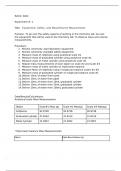
-
CHEM 121 Lab 1 Equipment, Safety, and Mass/Volume Measurement Portage learning
- Other • 5 pages • 2024
- Available in package deal
-
- $20.49
- + learn more
Title: Equipment, Safety, and Mass/Volume Measurement Purpose: To go over the safety aspects of working in the chemistry lab. Go over the equipment that will be used in the chemistry lab. To observe mass and volume measurements. Procedure: 1. Review commonly used laboratory equipment. 2. Review commonly available safety equipment. 3. Measure mass of cellphone using analytical scale #1 4. Measure mass of graduated cylinder using analytical scale #1 5. Measure mass of metal cylinder using ...
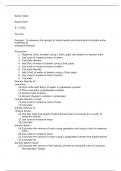
-
CHEM 121 Lab 2 Density SPRING 2024 Portage learning
- Other • 11 pages • 2024
- Available in package deal
-
- $22.49
- + learn more
Experiment #: 2 Title: Density Purpose: To measure the density of some liquids and solids which includes some materials of biological interest. Procedure: 1. Dispense 10mL of water using a 10mL pipet into beaker on zeroed scale 2. Use scale to measure mass of water 3. Calculate density 4. Add 5mL of water to beaker using a 5mL pipet 5. Use scale to measure mass of water 6. Calculate Density 7. Add 10mL of water to beaker using a 10mL pipet 8. Use scale to measure mass of water 9. Ca...
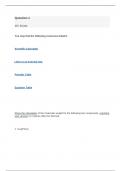
-
CHEM 121 Exam 2 SPRING 2024 Portage learning
- Exam (elaborations) • 39 pages • 2024
-
- $26.49
- + learn more
Show the calculation of the molecular weight for the following two compounds, reporting your answer to 2 places after the decimal. 1. Ca3(PO4)2 2. C9H8NO4Cl Your Answer: 1. 3(40.08)+2(30.97+4(16))=310.18 g/mol Ca3(PO4)2 2. 9(12.01)+8(1.008)+14.01+4(16)+35.45 = 229.61 g/mol C9H8NO4Cl 1. 3Ca + 2P + 8O = 310.18 2. 9C + 8H + N + 4O + Cl = 229.61 Question 2 9 / 10 pts You may find the following resources helpful: Scientific Calculator Links to an external site. Periodic Table Equation ...
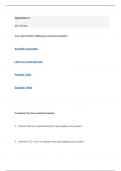
-
CHEM 121 Exam 1 SPRING 2024 Portage learning
- Exam (elaborations) • 17 pages • 2024
-
- $26.49
- + learn more
Complete the two problems below: 1. Convert 845.3 to exponential form and explain your answer. 2. Convert 3.21 x 10-5 to ordinary form and explain your answer. Your Answer: 8.453x10^2 - the decimal point was moved two places to the left - the first number was 8 .0000321 - the decimal point needed to be moved five spaces to the left. 1. Convert 845.3 = larger than 1 = positive exponent, move decimal 2 places = 8.453 x 102 2. Convert 3.21 x 10-5 = negative exponent = smaller than 1, move ...
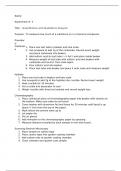
-
CHEM 121 Lab 3 Quantitative and Qualitative Analysis SPRING 2024 Portage learning
- Other • 5 pages • 2024
- Available in package deal
-
- $21.49
- + learn more
Title: Quantitative and Qualitative Analysis Purpose: To measure how much of a substance is in a chemical compound. Procedure: Carbonate 1. Place one test tube in beaker and tare scale. 2. Use scoopula to add 1g of the carbonate. Record exact weight and place carbonate into beaker. 3. Add sulfuric acid to test tube (~⅓ full ) and place inside beaker 4. Measure weight of test tube with sulfuric acid and beaker with carbonate and record. Tare scale again. 5. Pour sulfuric acid into bea...
CHEM 121 Final Exam (2023/2024) questions and answers

Did you know that on average a seller on Stuvia earns $82 per month selling study resources? Hmm, hint, hint. Discover all about earning on Stuvia



